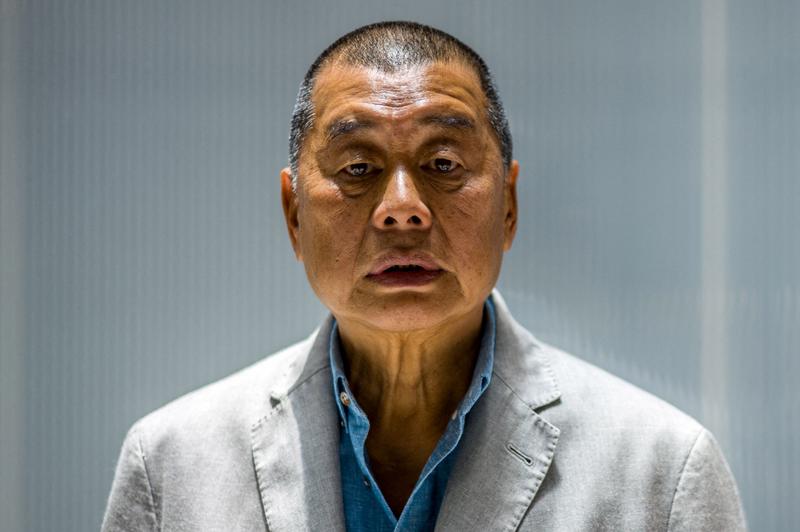A lawyer for prominent Hong Kong democracy activist and newspaper founder Jimmy Lai (黎智英) argued yesterday that it was not wrong to support freedom of expression, as he made final arguments in Lai’s landmark sedition trial.
Barrister Robert Pang (彭耀鴻) was representing Lai in his fight against charges of colluding with foreign forces to endanger national security and conspiring with others to issue seditious publications. Lai, 77, faces up to life in prison if convicted under a national security law imposed by Beijing following anti-government protests in 2019.

Photo: AFP
The high-profile trial, which has lasted 150 days so far, entered its final stage this week, though the date for a verdict remains unclear. Foreign governments and political observers are closely monitoring the outcome, which is widely seen as a barometer of the city’s judicial independence and press freedom.
As the defense began its closing arguments, Pang said it was not wrong to hope that the government would change its policies, whether through internal review or pressure, whether from inside or outside of Hong Kong.
“It’s not wrong to try to persuade the government to change its policy. Nor is it wrong not to love a particular administration or even the country,” he said.
He added that the prosecution seemed to have dismissed human rights as an alien concept.
Prosecutors have deemed 161 articles published in Lai’s now-defunct Apple Daily newspaper to have been seditious. Pang pushed back against that notion, using three examples to argue that they were just “reporting,” and that the items in question were only a small fraction of what the newspaper published.
Judge Esther Toh (杜麗冰) said the three-judge panel was looking at the content of the articles, not the number, and said she was not playing a mathematical game. She said it is not wrong not to love the government, but it becomes wrong when someone does that through certain nefarious means.
Earlier in the day, prosecutor Anthony Chau (周天行) concluded his closing statement, arguing that Lai was a mastermind of a conspiracy linked to foreign collusion, and that his testimony during the trial has not been credible.
The hearing was to resume today. Despite health issues, Lai has continued to appear in court since the final arguments began on Monday.
Concerns over Lai’s health delayed the trial last week after Pang reported that his client had experienced heart palpitations and the judges wanted him to receive medical treatment first.
A heart monitor was delivered to Lai.
On Friday last week, the Hong Kong government said a medical examination of Lai found no abnormalities and that the medical care he received in custody was adequate.

Auschwitz survivor Eva Schloss, the stepsister of teenage diarist Anne Frank and a tireless educator about the horrors of the Holocaust, has died. She was 96. The Anne Frank Trust UK, of which Schloss was honorary president, said she died on Saturday in London, where she lived. Britain’s King Charles III said he was “privileged and proud” to have known Schloss, who cofounded the charitable trust to help young people challenge prejudice. “The horrors that she endured as a young woman are impossible to comprehend and yet she devoted the rest of her life to overcoming hatred and prejudice, promoting kindness, courage, understanding

‘DISRESPECTFUL’: Katie Miller, the wife of Trump’s most influential adviser, drew ire by posting an image of Greenland in the colors of the US flag, captioning it ‘SOON’ US President Donald Trump on Sunday doubled down on his claim that Greenland should become part of the US, despite calls by the Danish prime minister to stop “threatening” the territory. Washington’s military intervention in Venezuela has reignited fears for Greenland, which Trump has repeatedly said he wants to annex, given its strategic location in the arctic. While aboard Air Force One en route to Washington, Trump reiterated the goal. “We need Greenland from the standpoint of national security, and Denmark is not going to be able to do it,” he said in response to a reporter’s question. “We’ll worry about Greenland in

PERILOUS JOURNEY: Over just a matter of days last month, about 1,600 Afghans who were at risk of perishing due to the cold weather were rescued in the mountains Habibullah set off from his home in western Afghanistan determined to find work in Iran, only for the 15-year-old to freeze to death while walking across the mountainous frontier. “He was forced to go, to bring food for the family,” his mother, Mah Jan, said at her mud home in Ghunjan village. “We have no food to eat, we have no clothes to wear. The house in which I live has no electricity, no water. I have no proper window, nothing to burn for heating,” she added, clutching a photograph of her son. Habibullah was one of at least 18 migrants who died

Russia early yesterday bombarded Ukraine, killing two people in the Kyiv region, authorities said on the eve of a diplomatic summit in France. A nationwide siren was issued just after midnight, while Ukraine’s military said air defenses were operating in several places. In the capital, a private medical facility caught fire as a result of the Russian strikes, killing one person and wounding three others, the State Emergency Service of Kyiv said. It released images of rescuers removing people on stretchers from a gutted building. Another pre-dawn attack on the neighboring city of Fastiv killed one man in his 70s, Kyiv Governor Mykola